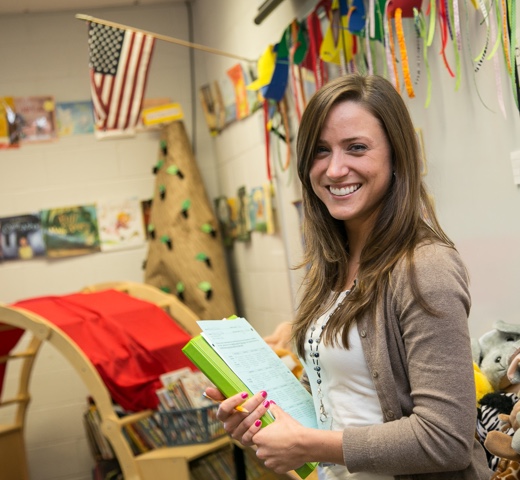
Early Childhood Education
- m
The speech and language pathology minor is a pre-professional course of study designed to prepare you to pursue graduate degrees in speech and language pathology or audiology.
There is a nationwide shortage of speech and language pathologists and audiologists. Professionals in this field have a variety of career options, including assisting people who have communication disorders, leading in healthcare or educational settings, dialect coaching and research.
Pair the minor in speech and language pathology with any major to meet your unique interests and to expand future employment options. Graduate programs in speech and language pathology accept students from varied majors who have fulfilled their pre-requisite courses. For students who decide not to pursue graduate studies in this field, completion of a paired major further expands your employment options.
Professionals who work as speech pathologists or audiologists earn certification, which requires specialized graduate degrees. To work as a speech and language pathologist or audiologist, you must first pursue a graduate degree.
Requirements for admission to graduate programs in speech and language pathology or audiology vary by school. The courses required by the minor fulfill commonly required pre-requisites for admissions to such programs. Because admission to those programs is highly competitive, you should also strive to earn a high GPA both in the courses for this minor and overall. Your minor advisor will work with you to investigate the unique requirements of graduate programs of interest to you.
You may pair this minor with any degree or major. Some majors work more naturally with this minor than others, but your minor advisor will work with you individually to plan for your personal career interests and assist in pairing this minor with your degree and major of choice.
This minor is of excellent benefit to students beyond those pursuing graduate studies in the field. Such content benefits a range of professionals—teachers who want to specialize in autism; theatre majors who want to practice dialect coaching; or engineers who want to design communication devices. The options are endless.
This minor may work as a “bridge program” for those who have already completed a bachelor's degree but now wish to pursue a graduate program in speech and language pathology. Some courses in this minor are offered only once each year, but all are offered during the fall semester.
Graduate programs in speech and language pathology or audiology typically require a human anatomy course that focuses on the anatomy involved in speech production and hearing. Because most graduate programs are specific in that requirement, you will not be able to substitute a more general anatomy course.
Some courses in this minor are only offered once each year. You should plan your courses carefully with your advisor.
In the Speech and Language Pathology program, you will take a selection of courses that successfully prepare you for a career in a related field. Hands-on experiences and classroom learning within the framework of Christian faith will give you the skills and knowledge to achieve your goals. Our programs offer a wide variety of courses that will not only help you excel in your future career, but challenge you to develop a deeper understanding of your field of study.
Graduates of the Speech and Language Pathology program work in positions of leadership in their places of employment, using the tools and knowledge a Messiah University education prepared them with. Each year, eager employers and some of the nation's best graduate schools welcome Messiah graduates into their organizations.
96% of the Class of 2022 respondents were employed or in graduate school within 6-9 months of graduation.
Regional and national employers seek out Messiah graduates for their academic preparation, work ethic and personal character. The transformation you experience at Messiah readies you to transform the lives of others through your chosen career path.
Learning in the classroom is important but actually applying that knowledge in a hands-on way can make all the difference. At Messiah University, the Experiential Learning Initiative (ELI) allows Messiah to take this hands-on learning to a new level by giving students the opportunity to apply what they have learned to various real world contexts--such as an internship/practica, service learning, off-campus program, holding a student leadership position, or participating in undergraduate research.